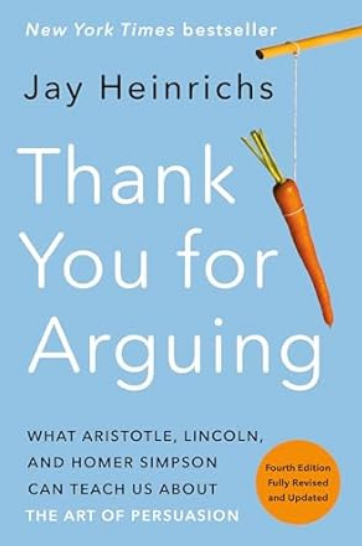Author: Jay Heinrichs
“Thank You for Arguing” by Jay Heinrichs is a comprehensive guide to the art of rhetoric, exploring how effective argumentation can be used in everyday life. Here’s a detailed summary and some reviews:
Summary
Introduction:
Heinrichs laments the decline of rhetoric in modern society and aims to reintroduce its concepts to the contemporary reader, demonstrating their relevance in daily interactions.
Part One: Offense
- Basics of Argumentation: Heinrichs introduces the three types of arguments defined by Aristotle: ethos (character-based), logos (logic-based), and pathos (emotion-based).
- Techniques: He discusses the importance of storytelling, controlling the “tense” of the argument (past, present, or future), and the concept of “kairos” (the perfect moment to make an argument).
Part Two: Defense
- Defensive Strategies: Heinrichs provides tips on defending against rhetorical tactics, identifying logical fallacies, and using techniques like concession (agreeing with an opponent to gain an advantage) and switching tenses to redirect arguments.
Part Three: Advanced Offense
- Advanced Tactics: This section covers demonstrating practical wisdom, showing virtue to gain trust, and using tactical flattery. Heinrichs emphasizes that effective persuasion is more important than simply winning an argument.
Part Four: Advanced Agreement
- Achieving Consensus: Heinrichs explains how to drive consensus and find common ground, stressing the moral responsibility that comes with mastering rhetoric. He urges readers to use these techniques to seek truth and foster understanding rather than just winning arguments.
Conclusion:
Heinrichs reiterates the importance of rhetoric as a tool for better understanding and healthier relationships, making classical rhetoric relevant and accessible to modern readers¹².
Reviews
Positive Reviews:
- Engaging and Practical: Many readers appreciate Heinrichs’ engaging writing style and practical advice, finding the book both informative and entertaining.
- Relevance: The book successfully connects ancient rhetorical theories to modern applications, making it a valuable resource for anyone looking to improve their persuasive skills.
Critical Reviews:
- Complexity: Some readers find the book’s concepts complex and challenging to apply without significant practice.
- Repetition: A few reviews mention that certain points are repeated throughout the book, which can be redundant for some readers¹²³.
Overall, “Thank You for Arguing” is praised for its insightful exploration of rhetoric and its practical applications in everyday life. It is a recommended read for anyone interested in improving their argumentation and persuasion skills.
Source:
(1) Thank You for Arguing by Jay Heinrichs Plot Summary – LitCharts. https://www.litcharts.com/lit/thank-you-for-arguing/summary.
(2) Thank You for Arguing | Summary and Key Lessons – BooksThatSlay. https://booksthatslay.com/thank-you-for-arguing-summary/.
(3) Thank You for Arguing Study Guide | Literature Guide – LitCharts. https://www.litcharts.com/lit/thank-you-for-arguing.
(4) Thank You For Arguing Summary and Study Guide | SuperSummary. https://www.supersummary.com/thank-you-for-arguing/summary/.
(5) Thank You for Arguing | Summary and Key Lessons – BooksThatSlay. https://bing.com/search?q=Thank+You+For+Arguing+summary+and+reviews.
(6) Thank You for Arguing Summary of Key Ideas and Review – Blinkist. https://www.blinkist.com/en/books/thank-you-for-arguing-en.


Leave a Reply